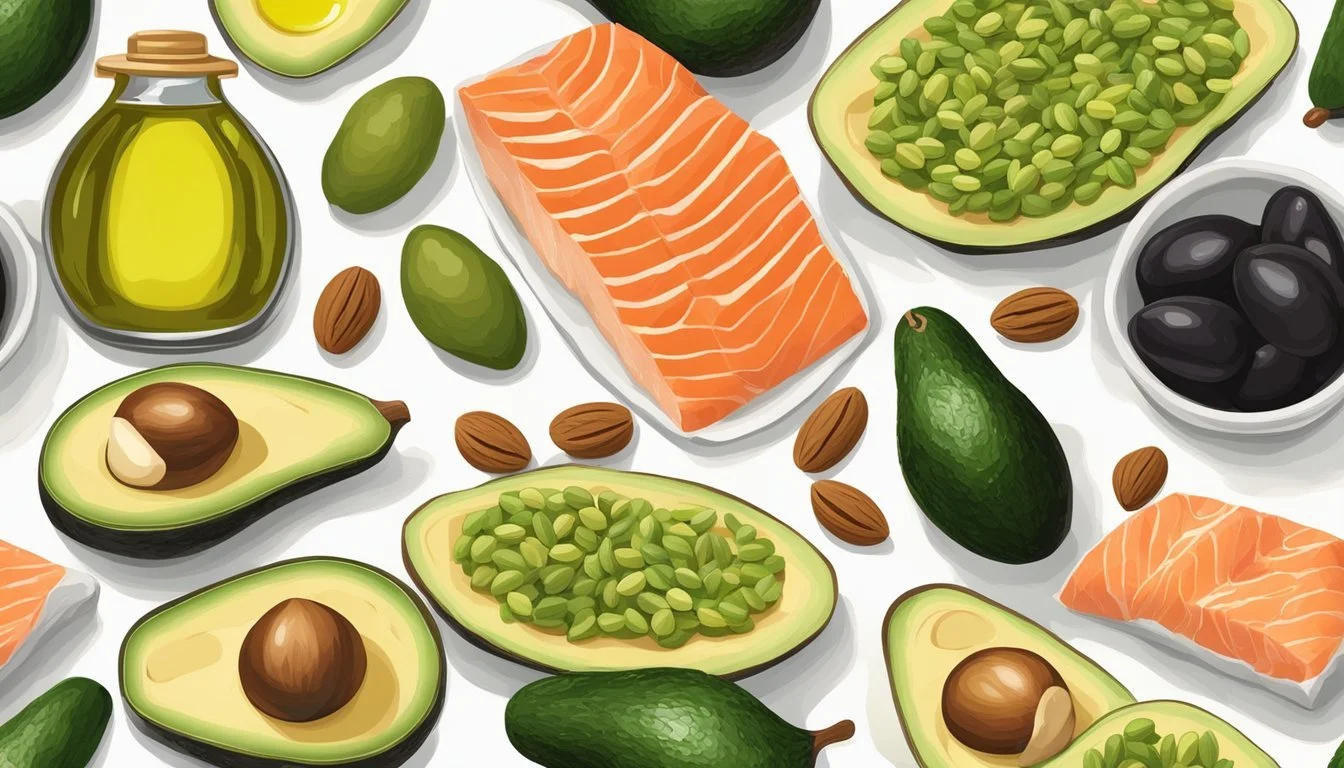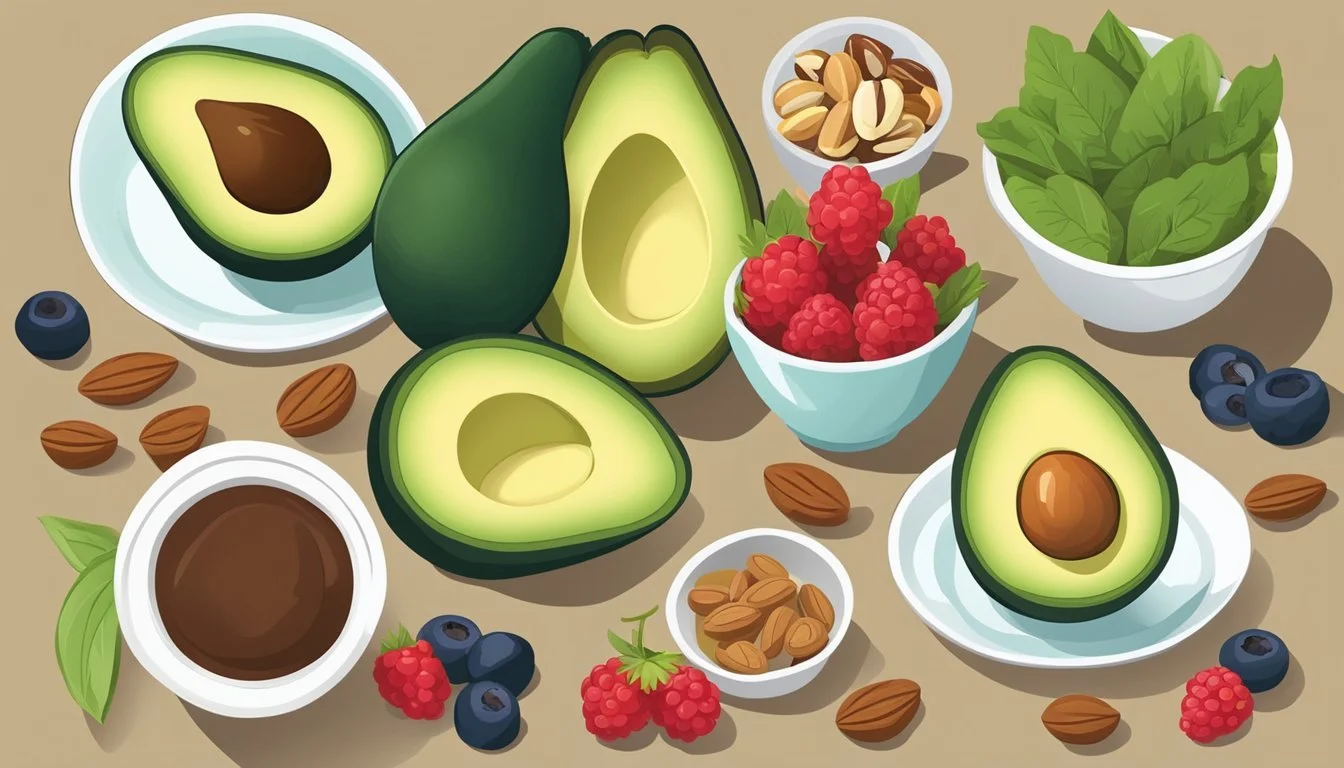Foods That Support Ketone Production in the Body
Boosting Your Ketogenic Diet
The ketogenic diet, commonly known as the keto diet, is designed to promote the production of ketones in the body by reducing carbohydrate intake and increasing fats. Understanding which foods can enhance ketone levels is essential for individuals looking to maximize the benefits of this diet.
Foods rich in certain types of fats, such as medium-chain triglycerides (MCTs), play a pivotal role in supporting ketosis. By incorporating these ketone-boosting foods into a balanced diet, one can improve their overall health and well-being while adhering to the ketogenic lifestyle.
1) Avocado
Avocados are an excellent choice for those following a ketogenic diet. They are rich in healthy fats, which are essential for maintaining ketosis. This high fat content helps provide long-lasting energy and supports overall cellular health.
Low in net carbs, avocados are particularly beneficial for those looking to minimize their carbohydrate intake. Most of the carbohydrates in avocados come from fiber, resulting in a low net carb count. This makes them highly suitable for keto enthusiasts.
In addition to their fat and fiber content, avocados offer a wealth of nutrients. They are packed with vitamins and minerals such as potassium, which is important for electrolytic balance. Including avocados in meals can help ensure nutrient density without compromising carb limits.
Avocados are also versatile in the kitchen. They can be used in a variety of dishes, from salads to smoothies. Their creamy texture and mild flavor make them a favorite in many keto recipes. Whether eaten alone or as part of a complex dish, avocados are an indispensable part of a ketogenic diet.
2) Coconut Oil
Coconut oil is a significant player in the ketogenic diet due to its high content of medium-chain triglycerides (MCTs). These MCTs, primarily composed of C8 and C10 fatty acids, quickly convert into ketones, helping to maintain a state of ketosis.
In addition to boosting ketones, coconut oil has a high smoking point. This makes it ideal for cooking, as it can withstand high temperatures without breaking down and oxidizing.
Coconut oil is versatile in its uses. It can be added to coffee, often referred to as "Keto Coffee". This involves blending coffee with coconut oil and butter, creating a creamy, rich drink that supports ketosis.
Coconut oil can also be used in various recipes for frying or baking. Its mild flavor complements both sweet and savory dishes, making it a staple in many keto-friendly meals.
3) Grass-Fed Butter
Grass-fed butter is a popular choice for those on a ketogenic diet. It's derived from cows that graze on natural diets, consisting mostly of grass. This type of butter tends to be richer in essential nutrients compared to its grain-fed counterparts.
One notable benefit of grass-fed butter is its higher content of omega-3 fatty acids. These fats are integral to various body functions and may promote heart health. Additionally, grass-fed butter contains more fat-soluble vitamins such as A, D, E, and K2, which are important for overall well-being.
In terms of taste, grass-fed butter is often described as richer and creamier, with slight "grassy" notes. This makes it not just a healthier option but also a preferred choice for culinary applications.
Moreover, grass-fed butter supports ketosis due to its high fat content and absence of carbs. This helps maintain the metabolic state necessary for burning fat for energy.
For best results, one should choose butter labeled as 100% grass-fed. This ensures the cows have been exclusively pasture-raised, contributing to the superior nutritional profile.
4) MCT Oil
MCT oil stands for Medium-Chain Triglyceride oil, which is known for its ability to quickly metabolize in the liver and support ketone production.
This oil is primarily made from coconut oil and palm kernel oil. The most beneficial MCTs for a ketogenic diet are caprylic acid (C8) and capric acid (C10). These particular acids convert into ketones more efficiently than others, providing quick energy.
Incorporating MCT oil into a diet can support weight management by helping suppress appetite. It also increases metabolic rate and energy levels, making it a popular choice for those following a keto lifestyle.
Adding MCT oil to meals or beverages can be a simple and effective way to boost ketone levels. It can be mixed into coffee, smoothies, or used in salad dressings.
MCT oil is a versatile and beneficial addition to a ketogenic diet, playing a key role in maintaining ketosis and providing sustained energy.
5) Wild-Caught Salmon
Wild-caught salmon is an excellent choice for those following a keto diet. Rich in high-quality protein and healthy fats, it supports muscle maintenance and overall health. Unlike farmed salmon, wild-caught varieties are typically lower in contaminants and higher in essential nutrients.
A standout feature of wild-caught salmon is its omega-3 fatty acid content. Omega-3s are known for their anti-inflammatory properties, making them beneficial for heart health and reducing inflammation. These fatty acids are crucial for those on a ketogenic diet, which prioritizes healthy fat intake.
Cooking wild-caught salmon is versatile. It can be grilled, baked, pan-fried, or even cooked on a griddle. Pairing it with keto-friendly sides like spinach or avocado enhances its nutritional value. Additionally, it can be seasoned with simple ingredients like olive oil, garlic powder, and sea salt for a flavorful meal.
Purchasing in bulk and freezing individual servings of wild-caught salmon is practical. This approach ensures a steady supply of high-quality protein, which is essential for maintaining ketosis. Healthy, convenient, and versatile, wild-caught salmon deserves a place in any keto-friendly meal plan.
6) Macadamia Nuts
Macadamia nuts are a top choice for those on a keto diet.
These nuts are packed with healthy monounsaturated fatty acids, fiber, B-vitamins, and essential minerals. With only 1.5 grams of net carbs per serving, they fit perfectly into low-carb dietary plans.
An ounce of raw macadamia nuts, which is about 28 grams or roughly 10 nuts, provides approximately 203.5 calories.
The rich fat content in macadamia nuts helps in maintaining ketosis, making them an ideal snack.
Additionally, they offer a nutty flavor that pairs well with various dishes.
Due to their low carb content and high nutrient density, macadamia nuts are praised in many keto guides and recipes. Whether enjoyed on their own or included in meals, they support the keto lifestyle effectively.
7) Eggs
Eggs are a vital component of a ketogenic diet. They are packed with high-quality protein, essential for muscle building and repair. Each egg contains about 6 grams of protein, making them an efficient and nutrient-dense food choice.
Eggs are also incredibly low in carbohydrates, fitting perfectly into the carb restrictions of a keto plan. With almost no carbs, they help maintain and promote ketosis. This aspect makes them a highly effective food for those following a strict ketogenic diet.
The high-fat content in eggs further supports the primary goal of a ketogenic diet. The fats found in eggs are predominantly healthy fats, contributing to the daily fat intake necessary to sustain ketosis. The balance of protein and fat in eggs makes them a nearly perfect food for keto enthusiasts.
Additionally, eggs provide several essential vitamins and minerals. They are a good source of vitamins such as B12, D, and E, which support various bodily functions. The presence of choline in eggs also aids in brain health.
In summary, eggs are a versatile and nutritious food that aligns well with the requirements of a ketogenic diet. Their low-carb, high-protein, and high-fat profile make them an excellent choice for maintaining ketosis and supporting overall health.
8) Chia Seeds
Chia seeds are an excellent inclusion in a ketogenic diet, providing numerous nutritional benefits while being low in net carbs.
These small seeds are rich in fiber, which supports digestion and helps maintain a feeling of fullness. One ounce of chia seeds contains around 138 calories, making them a dense source of energy.
In terms of macronutrients, chia seeds offer a remarkable profile. A two-tablespoon serving has approximately 9 grams of fat and 5 grams of protein. They are particularly high in omega-3 fatty acids, which have anti-inflammatory properties.
Chia seeds are also packed with essential minerals like calcium, phosphorus, and magnesium. These nutrients can be beneficial for individuals on a keto diet, where certain minerals may otherwise be lacking.
Additionally, chia seeds help in managing cholesterol and blood pressure levels, which contributes to overall heart health. They can be easily added to smoothies, yogurts, or baked goods, making them a versatile ingredient in many keto recipes.
In conclusion, chia seeds are a nutritious, keto-friendly option that supports various aspects of health, making them a valuable addition to a ketone-focused diet.
9) Greek Yogurt
Greek yogurt is a popular choice for those on a ketogenic diet.
It's known for being high in protein and can be a nutritious addition to a keto meal plan.
Plain Greek yogurt contains fewer carbs compared to regular yogurt.
Consuming Greek yogurt in moderation can help maintain ketosis.
It's essential to choose plain, unsweetened versions to avoid excess carbs.
Greek yogurt also provides beneficial probiotics.
These probiotics support gut health.
Pair Greek yogurt with keto-friendly nuts or seeds for added flavor and nutrition.
Keep portions in check to ensure carb intake remains low.
10) Almond Butter
Almond butter is a great option for those following a keto diet. Made primarily from ground almonds, it is rich in healthy fats and low in carbs. This makes it an ideal snack or ingredient for keto-friendly recipes.
A typical serving size of almond butter is about two tablespoons. This serving contains roughly 2.7 grams of net carbs, 17.8 grams of fat, and 6.8 grams of protein. Almond butter also offers valuable micronutrients such as calcium, magnesium, and vitamin E.
To ensure almond butter fits well into a ketogenic diet, it's essential to check the ingredient list. Avoid brands that add sugars or hydrogenated oils. The best choices are those that contain just almonds or almonds and a bit of salt.
Incorporating almond butter into your diet can be simple and versatile. Spread it on keto-friendly snacks, add it to smoothies, or use it as a dip for low-carb veggies. With its creamy texture and nutty flavor, almond butter can help satisfy cravings while keeping carb intake low.
Health Benefits of Foods High in Ketones
Foods high in ketones offer numerous health benefits due to their unique ability to shift the body’s primary energy source from glucose to fat. These benefits include enhanced cognitive function, improved energy levels, and effective weight management.
Enhanced Cognitive Function
Ketones serve as an alternative energy source for the brain when glucose levels are low. Studies have shown that a ketogenic diet, which increases ketone levels, can lead to improved memory and mental clarity. This is particularly beneficial for individuals with neurodegenerative conditions like Alzheimer's disease.
Some research suggests that ketones can reduce oxidative stress in the brain, which may help in preserving brain health over time. This improved energy efficiency in the brain often translates to better cognitive performance in daily tasks.
Improved Energy Levels
Foods high in ketones help in stabilizing insulin levels since the body relies less on sugar for energy. This can lead to more consistent energy throughout the day, avoiding the common energy spikes and crashes associated with high-carbohydrate diets.
Athletes and physically active individuals may see performance benefits as ketones can provide a steady and efficient fuel source. Additionally, ketones are known to support mitochondrial function, which plays a key role in maintaining cellular energy.
Weight Management
A diet rich in foods that increase ketone levels can be highly effective for weight management. By promoting a metabolic state of ketosis, the body becomes more proficient at burning fat for fuel. This can result in significant fat loss, particularly around the abdominal area.
Meals high in ketones can also help in reducing hunger and appetite, making it easier to adhere to calorie-restricted diets. As the body adjusts to using fat as its primary energy source, it converts stored fat into ketones more efficiently, aiding long-term weight maintenance.
How Ketones Affect Metabolism
Ketones play a crucial role in energy production, particularly during low carbohydrate intake. They help manage blood sugar levels and provide an efficient energy source by metabolizing fats.
Ketone Production Mechanism
The liver is the center of ketone production. When carbohydrate intake is low, the body needs an alternative fuel source. It then breaks down fatty acids from body fat and dietary fat into acetyl-CoA, which is further converted into ketone bodies.
Primary Ketones: There are three main ketones: β-hydroxybutyrate (βOHB), acetoacetate, and acetone. Each plays a role in energy metabolism.
Process Name: This conversion process is called ketosis.
Transport: Ketones travel through the bloodstream to other organs and tissues, including the brain and muscles, where they are used for energy.
Impact on Blood Sugar Levels
When the body relies on ketones, it reduces dependence on glucose. This shift helps stabilize blood sugar levels by minimizing fluctuations caused by carbohydrate intake.
Steady Energy Source: Ketones provide a steady energy supply, preventing the rapid spikes and crashes that can occur with sugar.
Beneficial for Diabetics: This is particularly beneficial for people with diabetes as it helps in maintaining better glycemic control.
Reduced Insulin Dependency: Reduced carbohydrate intake also means the body needs less insulin, lowering the risk of insulin spikes.
These mechanisms ensure that the body efficiently utilizes fat for energy while maintaining stable blood sugar levels.
Potential Side Effects
While foods high in ketones can be beneficial for many, they also come with some potential side effects. Key areas of concern include digestive issues and electrolyte imbalances.
Digestive Issues
When starting a diet high in ketones, individuals might experience several digestive problems. Common symptoms include constipation, diarrhea, and stomach cramps. The abrupt increase in fat intake can place stress on the digestive system, leading to these issues.
Constipation is frequent due to the reduced fiber intake from excluding high-carb foods such as fruits and whole grains.
Diarrhea may result from consuming high amounts of dietary fats, including oils and fatty foods.
To mitigate these issues, it is advisable to gradually transition into the diet and ensure adequate fiber intake through low-carb vegetables.
Electrolyte Imbalance
Electrolyte imbalance is another potential side effect of a high-ketone diet. This happens because as the body transitions into ketosis, it excretes more water and electrolytes.
Loss of sodium, potassium, and magnesium can lead to symptoms such as dizziness, headaches, and muscle cramps.
A well-balanced intake of electrolyte-rich foods or supplements can help alleviate these symptoms. Additionally, ensuring proper hydration is crucial to maintaining the electrolyte balance in the body.
For those on such diets, it is often recommended to consult with a healthcare provider to monitor these levels regularly.






